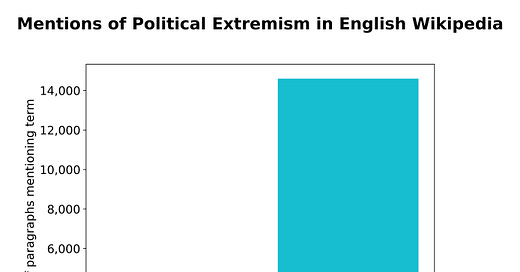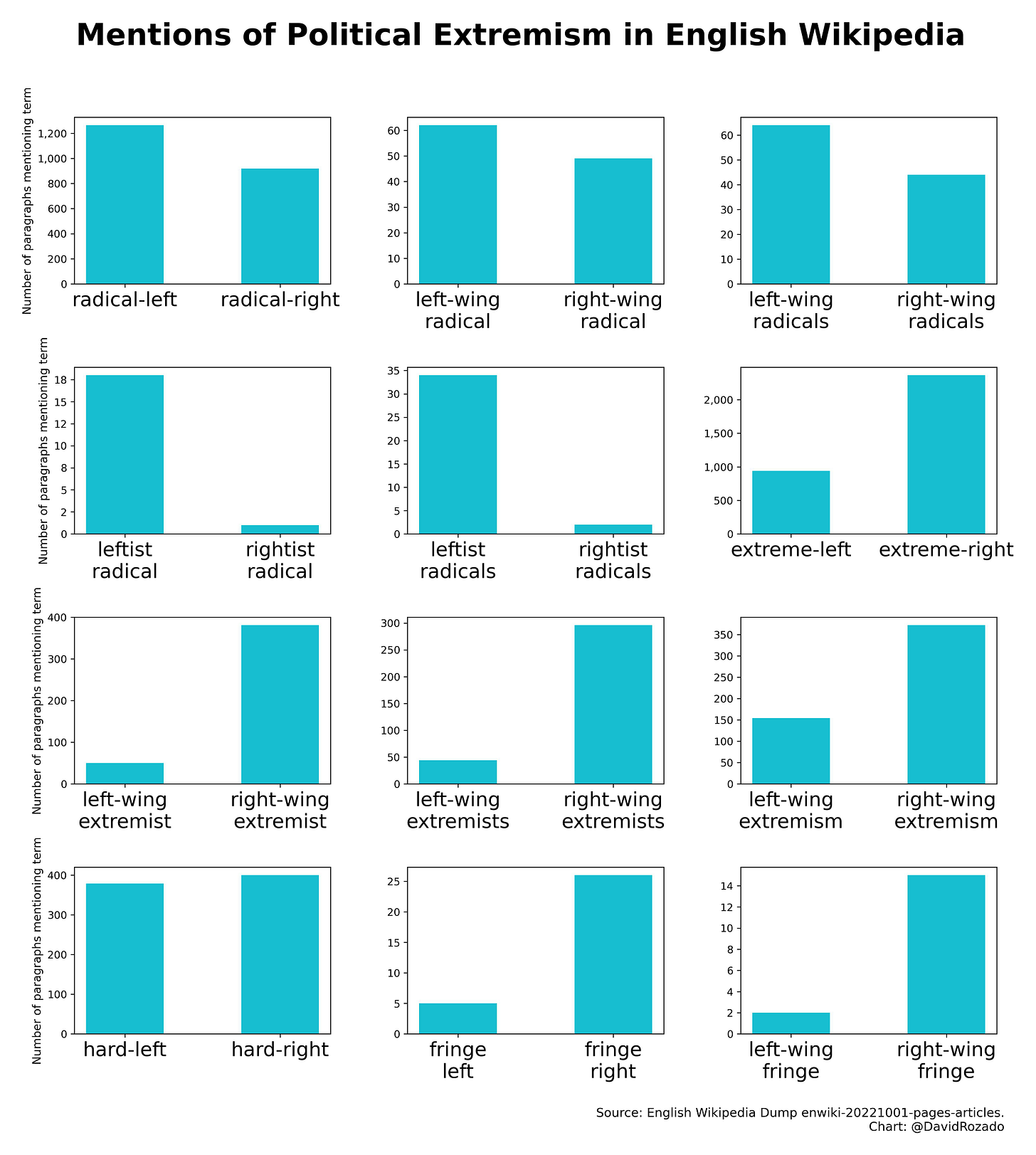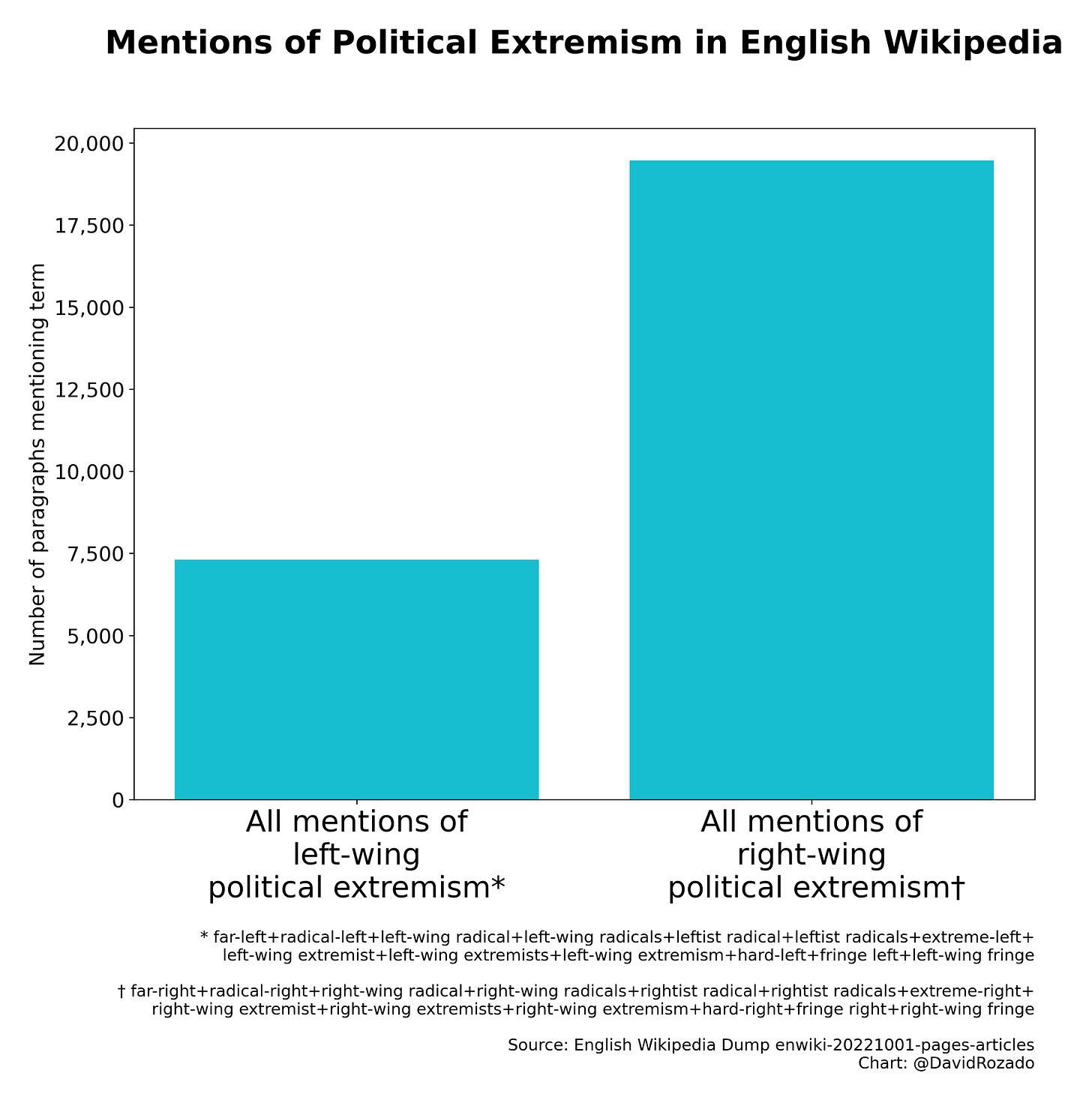Mentions of Political Extremism in English Wikipedia
A data-driven exploration uncovers disparities. Are they shaped by editorial choices or broader societal/historical dynamics?
In this post, I examine the frequency with which English Wikipedia articles mention left- and right-wing political extremism. My focus is on terms that often reflect subjective judgments about what constitutes political extremism (e.g., far-left, far-right, left-wing extremism, right-wing extremism). I differentiate such terms from others that also reference political extremism but that are often necessary to describe historical phenomena, such as communism or fascism. However, I acknowledge that these distinctions can occasionally blur depending on the context. I start by presenting the key findings, followed by a brief explanation of the methods used.1
To get straight to the point: English Wikipedia contains roughly three times as many mentions of the far-right compared to the far-left.
The terms far-left and far-right are not the only expressions used to describe left- and right-wing political extremism. Therefore, I also analyze a symmetric set of additional terms that also reference political extremism on both sides of the ideological spectrum.
The results in this case present a more nuanced picture. On English Wikipedia, terms using the adjective extreme to describe political extremism are more frequently associated with right-wing ideologies than with left-wing ones. Conversely, terms using the adjective radical tend to be more commonly linked to left-wing ideologies than to right-wing ones. However, it is crucial to consider the scale of the y-axes in the figures above. The terms far-right and far-left are by far the most common terms used to refer to political extremism.
Thus, when aggregating all the terms in the symmetric construct used to capture mentions of political extremism on both the left and right, the initial findings hold: English Wikipedia contains nearly three times as many references to right-wing political extremism as to left-wing political extremism.
For completeness, I also plot below mentions of specific extreme ideologies (e.g., communism, fascism) in English Wikipedia. However, these terms are less relevant to the current analysis since they are often needed to objectively describe historical phenomena. Terms such as far-right and far-left on the other hand are inherently more subjective and thus more pertinent to the present discussion.
The patterns observed in English Wikipedia are reminiscent of trends in news media coverage. As I have shown in previous analyses, news outlets tend to also reference far-right extremism more often than far-left extremism, though exceptions exist, such as Fox News or the New York Post.
The key question raised by this descriptive analysis is whether the observed trends reflect editorial choices by Wikipedia contributors/editors or broader societal and/or historical dynamics. This question, however, cannot be conclusively determined with the observational method used here. For those interested on the topic of potential political bias in Wikipedia, I refer to my earlier work on average sentiment in Wikipedia content towards politically aligned public figures such as U.S. politicians, Supreme Court Justices, or journalists. That analysis showed that, on average, Wikipedia articles contain more positive sentiment towards left-of-center public figures than towards their right-of-center counterparts.
I conclude by acknowledging Wikipedia's remarkable contributions to enhancing information accessibility and promoting open knowledge. However, while Wikipedia’s role in disseminating and decentralizing knowledge is undeniably commendable, a growing body of suggestive—though not conclusive2—evidence (e.g., here, here, here and here), hints that Wikipedia may be struggling to fully adhere to its Neutral Point of View (NPOV) policy.
A note on Methods: To ensure the integrity of the frequency counts reported above, I provide a link to a file containing the analyzed terms, the corresponding Wikipedia paragraphs where the terms appear, and the URLs of the corresponding Wikipedia articles. Two important points to note: First, the data source is the Wikipedia Dump file "enwiki-20221001-pages-articles-multistream.xml," retrieved on October 15, 2022. The raw content was parsed to extract only the textual data from articles, excluding metadata and other non-article information. The final article text-only dataset is 23.6 GB in size. While the URLs provide a reference to the article where each target term appeared as of October 2022, some of the content of the articles may have changed since then. Second, the analysis above did not disambiguate terms with multiple meanings. For instance, a small fraction of the paragraphs analyzed use far-right to describe the position of an entity in a photograph, not political extremism. This is not too limiting for the results as there is no reason to expect such mentions to disproportionately outnumber equivalent uses of far-left. And still, even when excluding far-right and far-left from the analysis, the remaining references to right-wing political extremism (4,870) still outnumber all remaining references to left-wing political extremism (3,019).
Tilman Bayer, co-maintainer of @WikiResearch, conducted a comprehensive critical review about my previous analysis on average sentiment towards political public figures in Wikipedia articles. While acknowledging merit to my work, he also raised valid methodological limitations such as the implicit assumption in my analysis that average sentiment between left- and right-leaning terms within a mostly U.S. focused analysis should be statistically indistinguishable and if not, bias is possible—a premise that is indeed debatable, as Bayer correctly noted.










why should the null hypothesis be that mentions of left extremism should be equal to mentions of right wing extremism? this is the aggregate human knowledge, it is like saying ornithology is mentioned less than quantum chromodynamics hence Wikipedia is biased against ornithology. if there is an argument to be made about the equal occurance of left vs right wing extremism in the world I would like to see it.
Great research.